Required Reading
by Powell's Staff, March 20, 2015 9:00 AM
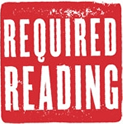
Ahead of a trip, many of us gravitate toward books that depict the history and culture of our travel destination. But it can work the other way around, too. Sometimes a book provides such a powerful sense of place that we find ourselves longing to visit the area we read about. Some of us even act on this urge. Here are the books that inspired us to pack our bags and explore someplace new.
÷ ÷ ÷
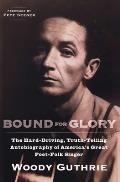 Bound for Glory Bound for Glory
by Woody Guthrie
I read Bound for Glory, Woody Guthrie's autobiography, when I was 15 or 16. It filled me with such an intense longing to travel that I actually dropped out of high school, specifically to become a vagabond, and, at 18, bought a plane ticket to Europe. I called my mom from Amsterdam to let her know where I was and that I had no actual money. I stayed with a friend's family in Germany till she could wire some cash to me, and I spent three months drifting around. I'm still amazed that my mom never said a word about it.
– Bitty
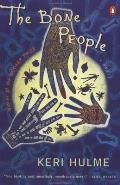 The Bone People The Bone People
by Keri Hulme
I have never been so affected by a book as I was by The Bone People. Author Keri Hulme draws you into the life of Kerewin, a reclusive, eccentric, and deeply rooted New Zealand woman, and the unusual and shattering friendship she develops with a young boy and his father. This story wrung out my heart, stole my breath, and ultimately led me to fly to New Zealand, where I spent three unforgettable months immersed in the land from which Hulme drew her inspiration.
– Aliza
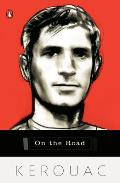 On the Road On the Road
by Jack Kerouac
I was never much of a traveler until I read Kerouac's classic. Soon after reading On the Road, I took my first solo road trip from St. Paul to San Diego. It wasn't long after that I was driving all around the states, and my travel itch did not go away. I eventually joined the Peace Corps and spent over two years living aboard. I believe it all began with On the Road.
– Jeff J.
|
Required Reading
by Powell's Staff, January 16, 2015 10:00 AM

We tend to think of reading as a cerebral endeavor, but every once in a while, it can spur action. The following books — ranging from inspiring biographies to evocative fiction to instructional guides — motivated us to step out of our comfort zones and make significant, lasting changes in our lives.
÷ ÷ ÷
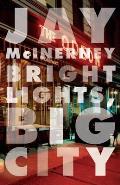 Bright Lights, Big City
Bright Lights, Big City
by Jay McInerney
When I first moved at age 20 from Boise, Idaho, to New York for college, I was a quiet, shy kid who admittedly thought New York City was one of those places where, when walking around, you didn't want to look anyone directly in the eye, you should always know where your wallet is, and you should only go out in the daylight. Then I read Bright Lights, Big City. The novel inspired me to wander, often alone, and take subways through Brooklyn at 3 a.m.; get into musical shows where I wasn't even old enough to be there; and go dancing at African jazz clubs and find myself falling asleep on the shoulder of a new friend and then ride the Long Island Rail Road back to my dorm just as the sun was rising. Ultimately, the adventures of the main character in this novel inspired me to take risks, not be afraid of new places, and really experience everything that makes the Big Apple what it is.
– Nick Y.
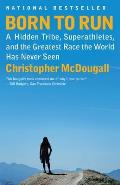 Born to Run
Born to Run
by Christopher McDougall
McDougall's story about a tribe of superathletes is probably the bestselling running book of all time. This book launched the minimalist running boom and was responsible for a cultural shift that changed the way we view this popular recreational activity. For me and for many other readers, the book also had another effect. It served as inspiration and motivation to push our preconceived limits. I used to think of the 26.2-mile marathon distance as the ultimate running goal, but because of this book, I've now completed several 50-mile and 100-mile races. If you're not careful, Born to Run will subtly trick you into running faster and farther than you ever thought possible.
– Shawn
Just to be clear, I lean toward the academic rather than fitness-intensive side of life. That being said, McDougall's book captured the intellectual side of me with its multiple angles on running. Imagine my surprise when, as I finished the book, I found myself inspired to turn my daily walks into runs. I even ran in Portland's half marathon, and I'm planning on signing up for the full marathon this year. Talk about born to run, man!
– Rachel G.
|
Required Reading
by Powell's Staff, April 29, 2014 12:04 PM

It's spring! The sun is shining. The flowers are in bloom. We're in a good mood. So for our latest round of Required Reading, we lined up our 25 favorite funny novels. Whether biting, riotous, savage, or slapstick, each of these books consistently makes us laugh.
÷ ÷ ÷
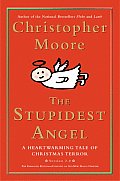 The Stupidest Angel
The Stupidest Angel
by Christopher Moore
Christopher Moore is one of the most reliably funny writers around, but this is one of the few books I've ever reread. Moore merges some disparate threads from earlier novels (the angel Raziel from Lamb, Pine Cove from The Lust Lizard of Melancholy Cove) and produces a laugh-out-loud funny Christmas parody, complete with zombies. Definitely a must-read!
– Tom L.
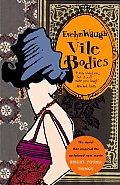 Vile Bodies
Vile Bodies
by Evelyn Waugh
The great thing about Evelyn Waugh is that the humor of his novels transcends their era. You don't have to know anything about English society of the 1920s to be entertained by Vile Bodies because Waugh's style relies on fundamentally silly characters, wry dialogue, piercing intelligence, and manic energy more than on contemporary culture, events, and figures. Witty, irreverent, and hysterical — Vile Bodies is Waugh at the height of his satirical talents.
– Gary L.
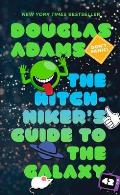 The Hitchhiker's Guide to the Galaxy
The Hitchhiker's Guide to the Galaxy
by Douglas Adams
This is the book that reveals the answer to life, the universe, and everything; teaches the importance of knowing where your towel is; tells why it is vitally important to get a receipt when you visit the lavatory on the planet Bethselamin; and disproves the existence of God by proving he exists (with the help of a fish). It is filled with sentences like, "The ships hung in the sky in much the same way that bricks don't." It is the perfect book if you want to startle everyone around you by constantly breaking out in uncontrollable laughter.
– Doug B.
|
Required Reading
by Powell's Staff, March 10, 2014 11:27 AM

This round of Required Reading is dedicated to the place we at Powell's Books call home: the great Pacific Northwest. Whether you're from the area or you simply appreciate the region for its beauty, history, or temperament (or legendary bookstore), these titles will give you a more nuanced understanding of this peculiar corner of the U.S.
÷ ÷ ÷
FICTION
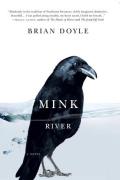 Mink River
Mink River
by Brian Doyle
Mink River is Pacific Northwest fiction at its finest. Doyle plunges us head first into the lives of the residents of a soggy, fictional Oregon coast town, Neawanaka. Rich with both Native American and Irish storytelling, Mink River lets us inside the raw, honest lives of ordinary people and makes us see the extraordinary in them. Long after you have read this novel, you will find yourself wondering what the characters are doing now and hoping that all is well in the fictional little town you've come to love.
– Koa
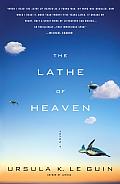 The Lathe of Heaven
The Lathe of Heaven
by Ursula K. Le Guin
The Northwest's very own SFWA Grand Master writes a philosophical novel set in Portland, Oregon. George Orr goes to sleep and awakes in the world of his dreams — still Portland, but... different. Now anytime he goes to sleep, the world is capable of shifting, and no one seems to notice. What is the true world? How does one bear such a gigantic responsibility? Big-idea sci-fi at its finest.
– Kaila
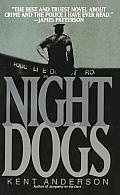 Night Dogs
Night Dogs
by Kent Anderson
Night Dogs is a novel that takes place in Portland in the '70s. James Crumley has called it the best police story he has ever read, and I would have to agree. The dialogue is so strong that it cries out to be filmed by Scorsese à la Taxi Driver. Also, an entire chapter takes place at a Powell's stand-in called The Blue Dolphin.
– Jason C.
|
Required Reading
by Powell's Staff, November 26, 2013 10:00 AM
 |
At Powell's, we love a good cookbook: the recipes that make you want to head straight for the kitchen, the mouth-watering photos, the advice on how to approach cooking and how to make recipes your own. We treasure cookbooks so much that many of us have shelves and shelves — and in some cases entire bookshelves — devoted to them at home. While we're not about to pare down our collections, we thought it might be interesting to consider what would happen if we had to give up all of those books except for one. What cookbook would get us through meal after meal, day after day? We asked Powell's staff this very question. Here's what they chose. |
÷ ÷ ÷
General
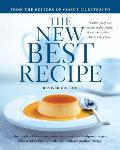 |
The New Best Recipe
by Cook's Illustrated
If I have to pick one book, I want it to be the book that explains in detail how it tested multiple versions of each recipe, what the results were, why the authors picked the one they decided was best, and what variations they suggest. At a thousand fully-explained recipes, this dictionary-size reference book is the first one I consult for everything from eggplant Parmesan to steamed mussels to carrot cake. Much more authoritative than Googling, it's the Consumer Reports of classic recipes.
–Suzanne G.
Also chosen by Mary Jo, Barb, and Tracey
|
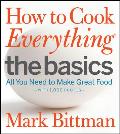 |
How to Cook Everything
by Mark Bittman
Full of straightforward, well-crafted recipes and amazingly beautiful step-by-step photos, this cookbook is a goldmine for chefs of all levels. Though it works well for even the most seasoned of culinary wizards, beginners will be especially delighted by the approachable tone and plethora of classic dishes contained within the book's nearly 500 pages. Add the expert instruction of universally loved author Mark Bittman and you've got the perfect cookbook.
–Angie D.
|
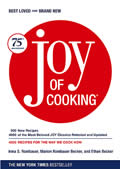 |
Joy of Cooking
by Irma S. Rombauer, Marion Rombauer Becker, and Ethan Becker
I come from a line of smart, independent women who swear by the Joy of Cooking — my mom and aunts received copies of it from their mom when they struck out on their own, and I got this 75th anniversary edition from them when I turned 18. It's a tome, yes, but it's also the only cookbook I consult with regularity because it has absolutely everything in it: not only recipes but also cocktails, techniques, household hints, etiquette, and more! I feel so much more confident in my abilities to feed myself, cook for others, and entertain because of this book, and you can bet that if I have a daughter, she'll be getting the latest edition from me.
–Sarah C.
|
|
Required Reading
by Powell's Staff, October 20, 2013 10:00 AM
|

|
While we here at Powell's are always up for a good horror flick, many of the most iconic scary movies were adapted from books. And no amount of special effects, creepy soundtracks, and camera tricks can outdo a chilling story written by a master. Below is our selection of books that trump their film adaptations in the fear department. While you might not find all of these books in the horror section, spooky mansions and supernatural forces aren't the only things that keep us up at night. |
÷ ÷ ÷
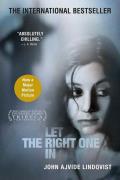 |
Let the Right One In
by John Ajvide Lindqvist
This book is not only creepy but also much more violent than the film. The film plays up the romance between the two little kids, which is downplayed in the book. What makes the book so disturbing is the fact that this little girl is a bloodsucking fiend whose childlike innocence is being taken advantage of by her elder male companion. To say their relationship is inappropriate would be an understatement.
–Nicolette L.
Also chosen by Brian B. and Desiree
|
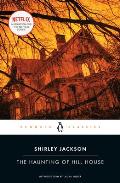 |
The Haunting of Hill House
by Shirley Jackson
The 1963 movie of this book, with its perfect casting of the late Julie Harris as the fragile, doomed Eleanor, is one of my all-time favorite spook flicks, but it still does not capture the incredible malevolence and inexplicability of a place gone very, very bad. That was the genius of the novel.
–Susan C.
|
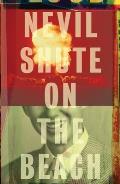 |
On the Beach
by Nevil Shute
Forget bumps in the night — is anything really scarier than certain death and the apocalypse? Written in 1947 and filmed in 1949, and again in 2000, On the Beach is a psychological novel about the human response to impending doom. Atomic war has come, and a group of survivors in southern Australia watch as city by city, nation by nation goes dark as the fallout makes its way down toward them. As the situation grows darker, some go crazy and some take refuge in routine — and others in unbridled hedonism. The dread and hopelessness intensify with every turn of the page, cranking up the anxiety even though we know how this ends — there will be no survivors. It's the only book I've ever had a nightmare about after finishing.
–Patrick D.
|
|
Required Reading
by Powell's Staff, September 11, 2013 1:56 PM
 In an age when everyone and their niece has written a tell-all book, when even fictional characters like Ron Burgundy are penning the stories of their lives, how does a memoir stand out among its peers? What qualities make it like nothing we've seen before?
Sometimes truly extraordinary experiences can launch a memoir into uncharted territory. Jewish-Austrian Holocaust survivor Simon Wiesenthal was troubled for years by questions surrounding forgiveness; his book, The Sunflower, became an investigation of these uncertainties. In other cases, such as Joe Brainard's I Remember, the subject matter may be familiar, even mundane, but the author's unorthodox method of storytelling creates a singular, unforgettable experience.
Below is a full selection of what we at Powell's consider to be the best unconventional memoirs. They do things a little differently, and they're better for it.
| Fun Home: A Family Tragicomic
by Alison Bechdel
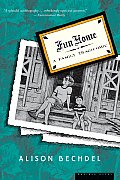 Fun Home, in concert with Craig Thompson's Blankets, was one of the works that proved to my doubting eyes that graphic novels could reach heights every bit as poetic, moving, and magical as the finest prose. Darkly funny but wholly sincere, the story of a young woman coming to terms both with herself and her father's lifetime of secrets (all the while growing up in a funeral home!) is hands down one of my favorite books, and the perfect gateway into a whole new genre. –Patrick D. Fun Home, in concert with Craig Thompson's Blankets, was one of the works that proved to my doubting eyes that graphic novels could reach heights every bit as poetic, moving, and magical as the finest prose. Darkly funny but wholly sincere, the story of a young woman coming to terms both with herself and her father's lifetime of secrets (all the while growing up in a funeral home!) is hands down one of my favorite books, and the perfect gateway into a whole new genre. –Patrick D.
Why Be Happy When You Could Be Normal?
by Jeanette Winterson
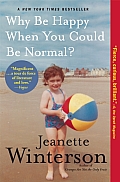 You know you're in for an interesting ride when the memoirist calls her mother "Mrs. Winterson," but this wry, unflinching look at a wildly dysfunctional adoptive family is anything but a pity memoir. Winterson untangles the complexities of her upbringing with clarity, wit, and grace, bringing a redemptive adult voice to her story. –Helen S. You know you're in for an interesting ride when the memoirist calls her mother "Mrs. Winterson," but this wry, unflinching look at a wildly dysfunctional adoptive family is anything but a pity memoir. Winterson untangles the complexities of her upbringing with clarity, wit, and grace, bringing a redemptive adult voice to her story. –Helen S.
Well
by Lisa Kron
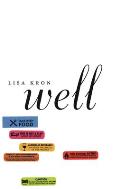 Lisa Kron wrote and starred in this "one woman show with other people in it" that went all the way to Broadway. The play concerns her relationship with her mother — and her mother's chronic ill-health — while also examining the methods, manner, and motivation behind confessional storytelling. Kron expertly uses all the tools of both playwright and monologist to create a completely engrossing hybrid experience. –Keith M. Lisa Kron wrote and starred in this "one woman show with other people in it" that went all the way to Broadway. The play concerns her relationship with her mother — and her mother's chronic ill-health — while also examining the methods, manner, and motivation behind confessional storytelling. Kron expertly uses all the tools of both playwright and monologist to create a completely engrossing hybrid experience. –Keith M.
|
|